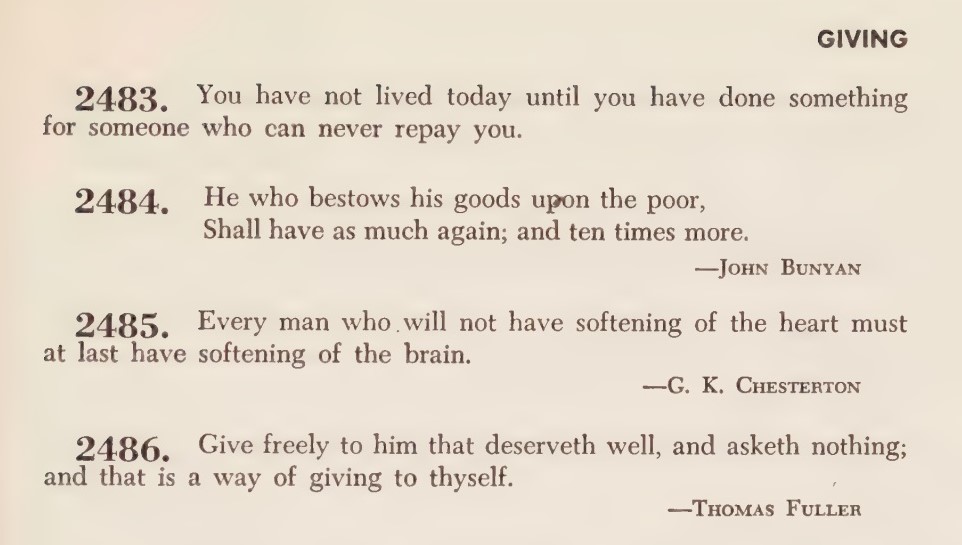John Bunyan? Paul Bunyan? Jacob Morton Braude? Frank Look? Eugene P. Bertin? Frank Ney? Titus? Anonymous?

Question for Quote Investigator: Altruism has been championed with the following saying:
You have not lived today until you have done something for someone who can never repay you.
This statement has been credited to the 17th-century Puritan preacher John Bunyan who was best known for authoring the religious allegory “The Pilgrim’s Progress”. The statement has also been ascribed to the North American lumberjack folk hero Paul Bunyan. However, I am skeptical. I have never seen a solid citation. Also, the phrasing sounds too modern for John Bunyan. Would you please explore this topic?
Reply from Quote Investigator: QI has found no substantive evidence supporting the attributions to John Bunyan or Paul Bunyan. QI conjectures that the incorrect linkage to John Bunyan occurred because individuals misread the text of a 1962 collection titled “Lifetime Speaker’s Encyclopedia” by Jacob Morton Braude.
Most of the quotations in the book were accompanied with attributions. But anonymous quotations specified no author. Here were four contiguous items. Boldface added to excerpts by QI:1
2483. You have not lived today until you have done something for someone who can never repay you.
2484. He who bestows his goods upon the poor, Shall have as much again; and ten times more. —John Bunyan
2485, Every man who will not have softening of the heart must at last have softening of the brain. —G. K. Chesterton
2486. Give freely to him that deserveth well, and asketh nothing; and that is a way of giving to thyself. —Thomas Fuller
Here is a scan showing part of a book page.

The first quotation was anonymous, and the second was credited to John Bunyan. Unfortunately, some readers incorrectly assigned both of these quotations to John Bunyan. This mistake corresponds to a known error mechanism in which an inattentive reader credits a statement to a well-known person whose name appears nearby.
The ascription to Paul Bunyan was probably caused by confusion between similar names.
Below are additional selected citations in chronological order.
The notion that one should attempt to help someone every day can be traced back to ancient times. Roman historian Suetonius who was born circa 69 CE wrote a work about “The Lives of the Twelve Caesars”2 which included a saying attributed to Roman emperor Titus Vespasianus who was born 39 CE. Titus reproached himself whenever a day passed without his benefiting another person:3
Amici, diem perdidi!
Friends, I have lost a day!
This anecdote provided an incomplete match for the notion under examination because it did not mention repayment.
QI believes that the saying evolved over time. For example, in 1949 columnist Frank Look of Folsom, California wrote the following:4
It seems to me that the more one does for someone else the better one feels inside. If you can do something for someone who can never repay you, it makes one feel very good. I know, for I have tried it.
In March 1957 a newspaper in Atchison, Kansas printed the following banner at the top of the first page. The statement was similar to the saying under examination:5
Today’s Lenten Thought: “You Have Not Lived A Perfect Day Until You Have Done Something For Someone Who Can’t Repay.”
In 1958 a community service organization in Victorville, California selected the following as a slogan:6
The volunteer group adopted the following slogan: “You have not lived a perfect day until you have done something for someone who can never repay you.”
In 1962 quotation compiler Jacob Morton Braude included the saying in “Lifetime Speaker’s Encyclopedia” as mentioned previously. The creator was anonymous:
You have not lived today until you have done something for someone who can never repay you.
In 1963 columnist Eugene P. Bertin of the “Pennsylvania School Journal” mentioned another version of the saying using the phrase “perfect day”:7
The greatest grace in giving is that it anticipates no return. The perfect day is one when you do something for someone who can never repay you. Giving a good word, a kind deed, a helpful hand can change the nature of a whole day.
In 1970 Mayor Frank Ney of Nanaimo, British Columbia, Canada employed the 1962 saying without attribution while raising funds for a charity:8
Mayor Frank Ney urged full community support for the appeal on Friday.
He said: “You have not lived today until you have done something for someone who can never repay you. This year, more than ever, your help is needed. Support the United Appeal.”
In 1976 Rev. James Tharp employed a close variant with the word “really”. No attribution was specified:9
You have not really lived until you have done something for someone who can never repay you.
In 1977 an article in “The Illinois Engineer” credited the 1962 version of the saying to John Bunyon, a misspelling of John Bunyan:10
“You have not lived today until you have done something for someone who can never repay you” —John Bunyon.
In 1979 the periodical “Fund Raising Management” credited the 1962 version of the saying to John Bunyan.11
In 1987 a newspaper in Lincoln, Nebraska printed a message of appreciation addressed to Girl Scouts. The saying was credited to the folk hero Paul Bunyan instead of the religious writer John Bunyan:12
THANK YOU GIRL SCOUT COUNCIL VOLUNTEERS!
“You have not lived today until you have done something for someone who can never repay you.” Paul Bunyan
In 1993 the compilation “Words of Wisdom: for Writers, Speakers, & Leaders” included an entry for the saying which credited John Bunyan:13
You have not lived today until you have done something for someone who can never repay you.
—John Bunyan (1628-1688)
In conclusion, this saying evolved for decades, and an exact match emerged in 1962. The creator remains anonymous. The attribution to John Bunyan is unsupported. This incorrect ascription was probably based on a misreading of the 1962 book mentioned above. The flawed ascription to Paul Bunyan was probably based on conflating the two names.
QI has examined other thematically related quotations. Here are two links to pertinent articles.
“A man’s character is most evident by how he treats those who are not in a position either to retaliate or reciprocate.” —Paul Eldridge (1948)
“You can easily judge the character of others by how they treat those who can do nothing for them or to them.” —Malcolm Forbes (1978)
Image Notes: Picture of food bundles for charity from Nico Smit at Unsplash.
Acknowledgement: Great thanks to Emma Searle whose inquiry led QI to formulate this question and perform this exploration. Also, thanks to Peter Morris who told QI about the remark attributed to Emperor Titus.
Update History: On April 30, 2024 the citations dated 1855 and 1949 were added to the article. In addition, two links to thematically related QI articles were added.
- 1962 Copyright, Lifetime Speaker’s Encyclopedia by Jacob Morton Braude, Topic: Giving, Quote Number 2483, Quote Page 309, Prentice-Hall, Englewood Cliffs, New Jersey. (Verified with scans) ↩︎
- 1855, The Lives of the Twelve Caesars by C. Suetonius Tranquillus, Translation by Alexander Thomson, Revision by T. Forester, Series: Bohn’s Classical Library, Quote Page 471, Henry G. Bohn, London. (Google Books Full View) link ↩︎
- 1949, The Home Book of Quotations: Classical and Modern, Selected by Burton Stevenson, Sixth Edition, Topic: Day, Quote Page 370, Column 2, Dodd, Mead and Company, New York. (Internet Archive at archive.org) ↩︎
- 1949 November 25, The Folsom Telegraph, Folsom Foibles by Frank Look, Quote Page 2, Column 1, Folsom, California. (Newspapers_com) ↩︎
- 1957 March 27, Atchison Daily Globe, (Banner at the top of the front page), Quote Page 1, Column 1, Atchison, Kansas. (Newspapers_com) ↩︎
- 1958 April 3, The Victor Press, Old Turner Home Leased For Use As Thrift Shop, Quote Page 4, Column 2, Victorville, California. (Newspapers_com) ↩︎
- 1963 December, Pennsylvania School Journal, Ravelin’s….Threads Detached from Texture by Eugene P. Bertin, Start Page 148, Quote Page 148, Column 2, Pennsylvania State Education Association, Harrisburg, Pennsylvania. (Verified with scans) ↩︎
- 1970 October 17, The Daily Colonist, Nanaimo Appeal: Cash Total Jumps, Quote Page 21, Column 2, Victoria, British Columbia, Canada. (Internet Archive; verified with scans) ↩︎
- 1976 November 1, Rushville Republican, Spiritual Pathways by Rev. James Tharp, Quote Page 4, Column 4, Rushville, Indiana. (Internet Archive; Verified with scans) ↩︎
- 1977 January, The Illinois Engineer, (Filler item), Quote Page 5, Illinois Society of Professional Engineers, Springfield, Illinois. (Internet Archive; Verified with scans) ↩︎
- 1979 November/December, Fund Raising Management, Unusual Quotes For Added Sparks In Gift Writing, Quote Page 50, Hoke Communications Inc., Garden City, New York. (Verified with scans) ↩︎
- 1987 April 26, Sunday Journal-Star, (Message of Thanks To Volunteers of Girl Scout Council), Quote Page 6C, Column 4, Lincoln, Nebraska. (Newspapers_com) ↩︎
- 1993 Copyright, Words of Wisdom: for Writers, Speakers, & Leaders, Compiled by Milton Murray and Philanthropic Service for Institutions, Chapter Giving, Quote Page 65, Philanthropic Service for Institutions, Adventist World Headquarters, Silver Spring, Maryland. (Verified with scans) ↩︎